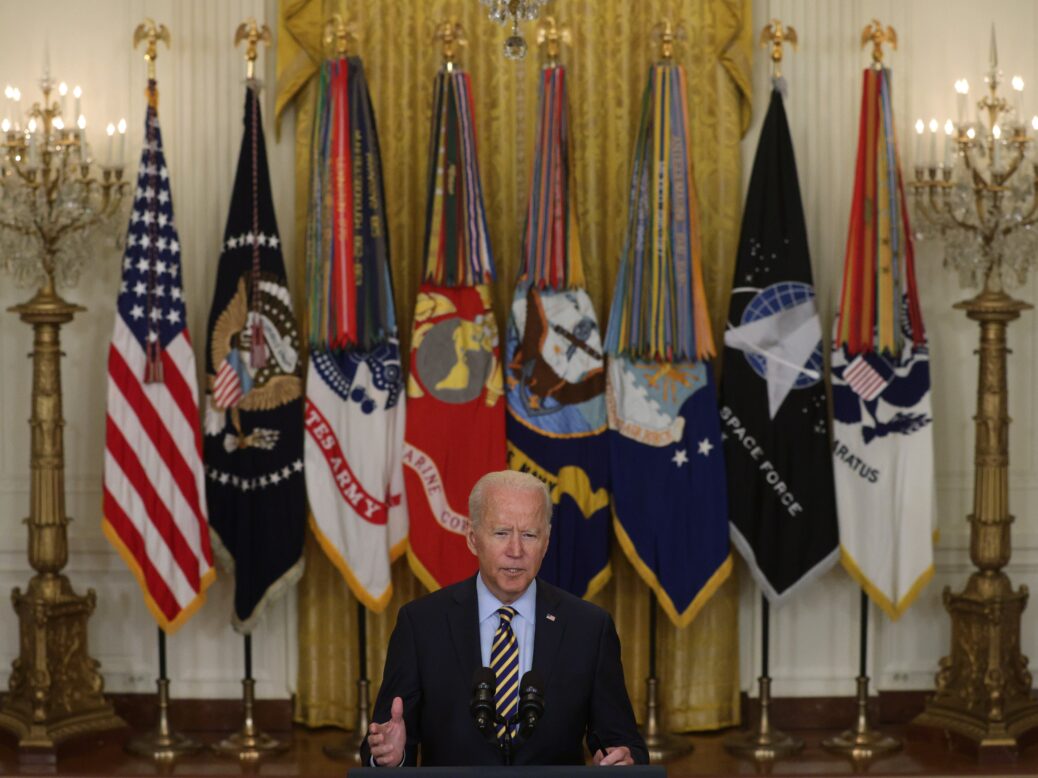
In April Joe Biden announced in a televised national address that it was time to end America’s “forever war”. The US “mission” in Afghanistan was never intended to be a “multi-generational undertaking” and he was satisfied that it was complete. But his sombre tone betrayed the reality on the ground: the Taliban has 60,000 full-time fighters, and hundreds of Afghan security personnel were reportedly being killed every month. Since the US-led invasion in 2001, Afghanistan has become a fully fledged “narco-state”, the world’s largest producer of heroin. The Taliban controls much of the opium trade and seems confident it will be in control of the country again before too long.
In May, as the holy month of Ramadan was coming to an end, a suicide car bomb attack outside the Sayed Ul-Shuhada school in the western district of Kabul killed at least 90 people and injured many more. Among the victims were Shiite Hazara schoolgirls who had just finished afternoon classes. Women and girls will be even more vulnerable to Islamist militant attacks in the post-US era. The Taliban and Islamic State, which has a growing presence in the country, especially despise educated girls and emancipated women, and are determined to reverse the progressive reforms of recent years.
Britain ceased all combat operations in Afghanistan in 2014, though a contingent of troops engaged in diplomatic, logistical and humanitarian activities stayed on as part of a transnational Nato presence for another seven years. By the time Donald Trump left the White House, the US had squandered in excess of $2trn on its military operations and 2,448 American service personnel had died, with nearly 21,000 injured. As many as 38,000 Afghan civilians had also died. The Taliban offered an unconditional surrender in December 2001, which the Americans rejected. Twenty years later, the Taliban seems stronger than it has ever been and its leaders are emboldened. Mission accomplished?
[see also: The US withdrawal from Afghanistan is advancing quickly – but so is the Taliban]
***
I’ve been watching Uprising, Steve McQueen and James Rogan’s three-part BBC docuseries about a house fire in New Cross, south-east London, in which 13 young black people died at a party in 1981. The films have no presenter and McQueen creates a compelling narrative by fusing survivor accounts with spoken-to-camera contributions from family members, former police officers, activists (such as Leila Hassan Howe, the widow of Darcus Howe, a long-time New Statesman columnist) and well-chosen and edited news footage from the period.
An open verdict was returned on the cause of the fire but the survivors are certain it was arson. Its motive: racism. The camera closes in on their weathered faces as they describe the panic in the house in the smoke-filled darkness; some of them jumped from first-floor windows and sustained life-changing injuries.
Uprising explores, without becoming didactic or strident, the socio-political context of the period: the unravelling of the social democratic postwar consensus, the rise of the National Front, the election of Margaret Thatcher, the Charles/Diana royal wedding and the Brixton riots. I was still at school in 1981 but the events of that year, especially the riots, are seared into my memory: an era was coming to an end as youths fought running battles with police on inner-city streets to the backdrop of Bob Marley songs, overturned cars and burned-out buildings. Back then Margaret Thatcher spoke of the country being “swamped” by immigrants, TV reports described the New Cross victims as “West Indians” not London-born black Britons, and the head of the Police Federation was relaxed about using the N-word on national television.
With his Small Axe films, and now with Uprising, McQueen is returning to the defining experiences of his adolescence to recreate an era of extraordinary political and social turmoil. He gives voice to those who were voiceless – or abused and despised – and shows how the events of 1981 are connected to the Black Lives Matter protests of today. As one of the contributors to Uprising puts it: “If you oppress people for long enough, eventually they will rise up and bite you on the ass.”
***
In August 1936 George Orwell, Jack Common, Reinhold Niebuhr, Karl Polanyi and Herbert Read were among the writers and philosophers who visited Langham, near Colchester in Essex, to speak at a summer school organised in association with the Adelphi, a literary journal founded by John Middleton Murry. Orwell’s talk was titled “An Outsider Sees the Distressed Areas” and afterwards he told Common he enjoyed his visit and “met some interesting people”.
The story of the summer school is told in Ken Worpole’s beautifully produced new book, No Matter How Many Skies Have Fallen (Little Toller), which is about a group of pacifists and religious socialists who, during the war, retreated to the Essex Tendring peninsula to establish a community farm committed to pastoral self-sufficiency. The Frating Hall Farm project was an experiment in “back-to-the-land” communal living – or rural communitarianism – an attempt to pursue a dignified, idealised political life in an age of upheaval. Among those who spent six months on the farm was the young Shirley Williams, daughter of Vera Brittain, author of Testament of Youth.
A former teacher, Worpole is a literary original, a social and architectural historian whose books combine the Orwellian ideal of common decency with understated erudition. Like Orwell, he is a conservative and a radical, or a left conservative, and deserves a wide readership.
***
I hope you enjoy this issue, our annual summer special. The print magazine returns in a couple of weeks; in the meantime, do visit our website, on which we publish a daily digital edition at 6pm, with new pieces added at weekends.
[see also: Summer special magazine]
This article appears in the 28 Jul 2021 issue of the New Statesman, Summer special





